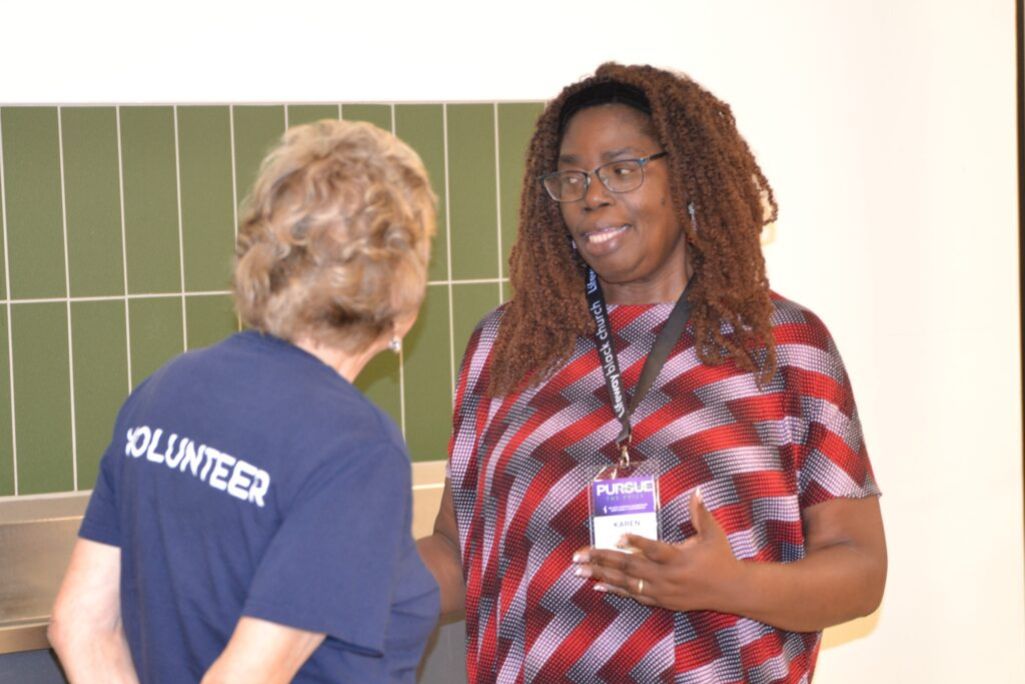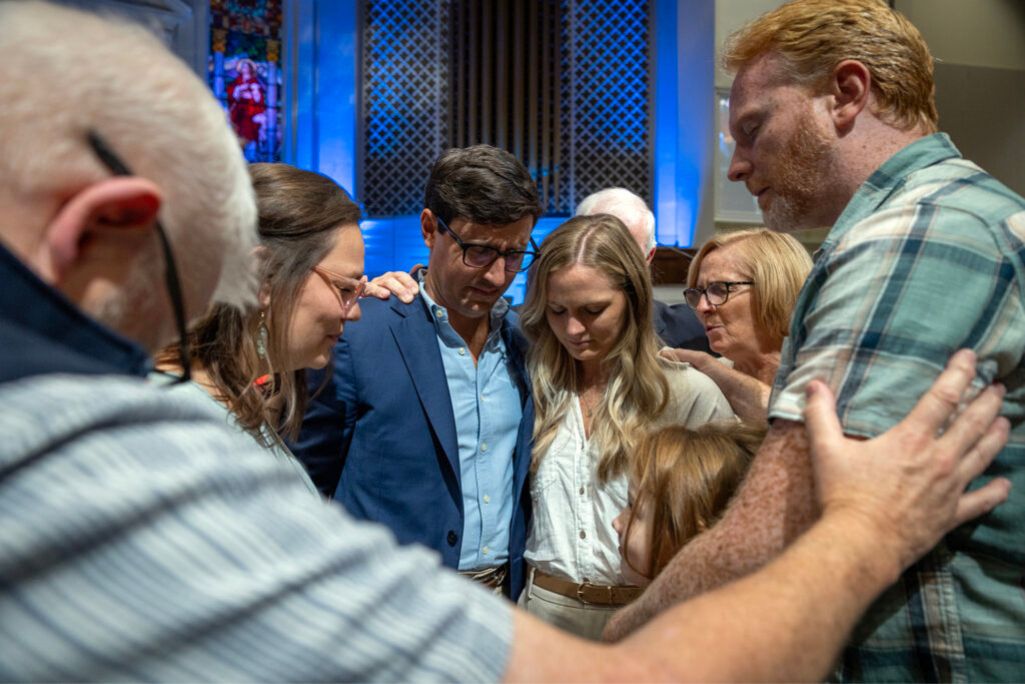
IMB missionary Karen Lee greets a volunteer in the cafeteria while attending the 2025 Black Church Leadership and Family Conference.
RIDGECREST, N.C. (BP) — She was a 16-year-old Karen Wilson when she heard the biblical call to missions, but it would be 22 years later before she received a long-term overseas assignment with the International Mission Board (IMB).
By that time she had married Richard Lee, the two had adopted their son Christian and had met IMB missionary David Cornelius, now retired, who guided their application to IMB.
They learned of the IMB’s response to their application at Glorietta Conference Center, then a Southern Baptist institution in New Mexico.
They thought they were on their way.
“Oh, this is good,” Karen said as she remembered that 1990s conversation. “Richard’s finished seminary, he’s working at a church. All these things were good and then they looked at me and said, ‘Karen, there’s just one problem. There’s a medical hold on you because you’re overweight.’”
Karen recalled her tears from long ago as she sat down with Baptist Press at the 2025 Black Church Leadership and Family Conference during a six-month stateside stay. Today, Karen and Richard Lee are nearly 25 years into career missionary service with the IMB, stationed in Tanzania.
The two share the story not only to encourage other African American Southern Baptists to consider long-term missions, but to also encourage applicants to persevere through an application process the couple said can be daunting.
Today, the IMB has about 3,500 missionaries on the field, and 27 are Black.
The Lees, together counted as one of the 27, believe several factors could explain the low number of Black IMB missionaries.
Among those reasons are an application process — applied to all applicants regardless of ethnicity — that the Lees said includes detailed personal and family medical inquiries that could discourage many.
“But what the IMB wants to do,” Richard said, “is they want to send healthy — physically, mentally, spiritually, emotionally — folks. It’s not a matter that they’re necessarily rejected, because a lot of people, as we found out, some of them sort of wash out before.”
“They take themselves out” of the application process before IMB weighs in, Karen said.
Upon learning of her medical hold due to weight, Karen had begun to cry, she said, and continued to cry throughout an entire commissioning service as the IMB sent out other missionaries who had passed the screening.
“Back then, they would march every flag that we had a missionary serving in represented. So from the time they marched in that first flag to the time they marched out that last flag, I never stopped crying,” she recalled. “I never stopped crying. I kept telling Richard when we started, when I went forward at 16, I wasn’t overweight.”
Karen was advised to lose 20-25 pounds before beginning the application process anew.
“I went home. I started working. I mean, working. I was losing weight the whole time. I was losing weight, losing weight.”
But she hit a wall about 10 pounds from her goal, unable to lose another pound.
Karen, who had delayed a pregnancy test because she had already suffered three miscarriages, found she was pregnant.
“I was two months into this pregnancy and didn’t know,” she told Baptist Press.
Around the same time, Richard was serving as an interim pastor when he received a “random call from the International Mission Board.” A doctor was on the line, looking at the Lees’ medical files.
Richard informed the doctor of Karen’s pregnancy. “She does not need to be losing weight,” the doctor proclaimed. “She needs to be taking care of that baby and making sure she’s healthy.”
The doctor told them of a program that would match their needs, the IMB’s International Service Corps (ISC), a two-year foreign missions program.
“Why don’t you consider doing that,” the doctor advised. Karen could give birth, work on losing weight while on the field in the ISC and then reapply for a long-term assignment when all was well.
It worked. Karen gave birth to Rebecca in 2000 and lost weight. In 2001, the Lees received a long-term post in Tanzania, first in Linzi and today in Dar es Salaam.
The Lees expressed thanks for IMB candidate consultants who guide applicants through the process.
“And say when they hit a sticky point,” Karen said, “instead of saying, oh, you know, ‘I can’t, I’m not qualified,’ you work through those issues. And it might not happen the first time you apply, but then you have opportunity to apply again.”
The Lees also applaud the many programs IMB offers to engage people in international missions, whether a few years, months or weeks.
Undeniable, the Lees said, is the need for missionaries who share ethnic traits with those they serve.
“Kama wewe kama sisi,” the Tanzanian Christians greeted the Lees in Lindi, meaning “you are like us,” Karen said. “And they cried. They said, ‘You have come to hold hands with us and share the gospel.’ And they said, ‘Are there others who look like you?’ They said, ‘We’ve never seen anybody like you to come share the gospel, to stand shoulder to shoulder with us.”
Could others come, they asked the Lees, others who look like them?
The Lees don’t dismiss the calling of missionaries of other ethnicities who have served in Tanzania since the IMB established a presence there in 1955, but said Blacks don’t have to break down a cultural barrier in working there.
“When we were going home, they said, ‘Can you go to your churches and tell our brothers and sisters to come?’
“And that is what we’ve tried to devote our time, every time we’ve come (stateside),” Karen said. “We’ve tried to go into our Black churches and say look, they’re begging for you to come.”
(EDITOR’S NOTE — Diana Chandler is Baptist Press’ senior writer.)


